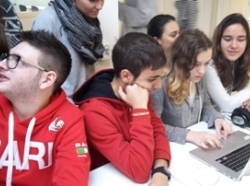Dutch and Italian students develop recommendations for lgbti safer schools

November 20, 2015 - "Create a on every school an alliance on the theme of human rights." That was a main recommendation of 40 straight and unidentified students from the Netherlands and Italy after for a week of research and consultation on how a school could become LGBTI - friendly.
Recommendations
The students came up with 10 recommendations:
- INTEGRATION: Everyone should receive education about sexual diversity, because it is relevant to everyone. This should not be taught in additional or separate classes, because that would emphasize "differences", and we would rather see LGBTI issues normalized. Lessons about sexual diversity should not repeat the same topics, like lingering on basic awareness. Lessons should be different each time. It is good to invite LGBTI people.
- TOGETHER: Students must work with teachers to determine the content of the lessons. Teachers should engage on a personal level with students. Education is not just learning facts, but also about personal development. Therefore, teachers need to be open and talk about sensitive issues.
- DISCRIMINATION ALLIANCES: The students were very impressed by their conversation with lesbian and gay pupils from some Dutch Gay / Straight Alliances. After discussion about this method, they decided that every school should have an alliance. But the preferred such an alliance to focus on the fight against discrimination in general and not only on LGBTI issues.
- SCHOOL BEHAVIOR: The students recommend that every school should have clear basic school rules on social behavior in school. They also think that it is essential that all students should be involved at the start of each year in the drafting of such rules.
- DIVERSITY: Students say that the term "sexual diversity" is better than "LGBTI". Acronyms keep labeling people and may lead to further stereotyping and stigmatizing. Furthermore, this struggle is not only about LGBTI. Heterosexual young people should also be emancipated.
- TRAINING: Training teachers is important. Otherwise, they cannot give good lessons on sexual diversity or support LGBTI students.
- HOTLINE: Schools should set up an anonymous email or telephone hotline. That way, students could ask questions and they can ask help of other students or teachers.
- MENTOR: The students would like ONE mentor that they can address their entire school career. The teachers commented they find this difficult to organize. They also feel that students need to learn to get guidance from different people. But the pupils think these arguments do not outweigh the disadvantages of a mentor that alternates each year.
- INTERACTIVE: Students find that the courses should be more interactive. This way would they become more involved with the knowledge. But more importantly: they would learn skills better that way when working interactive with each other.
- SPIRAL CURRICULUM: The students recommend that schools should improve the consistency of their program. Instead of modules and courses with individual lessons, the curriculum should have a logical and consistent build-up. This consistency should start in the first lesson of the first grade and last until the final exam lesson. This is especially important when it comes to basic skills and diversity.
Symposium for and by students
The recommendations were made by 12 Dutch students of the Amsterdam Hyperion College and 26 Italian students of Liceo Gaetano Salvemini (Bari, Italy) as part of an exchange program. The program is funded by the European Union (Erasmus + program).
The symposium was organized for and by the students themselves. In the week prior to the symposium they were engaged in an interactive program. The students did a school research on school safety and diversity, made an educational film about homophobia, prepared the recommendations and prepared the symposium. During the symposium, students organized everything themselves.
The content of the symposium centered on the students. At the beginning of the symposium, the students presented their recommendations for an LGBTI friendly school (recommendations 1-4). Then there were round table discussions of students with parents, teachers, Dutch activists and educators, foreign activists and a group of researchers and experts. After the round table discussions, the students withdrew and deliberated on the suggestions they received from the discussions. The symposium ended with a presentation by the students of how they had adjusted their final opinion on the basis of the suggestions (recommendations 5-10).


